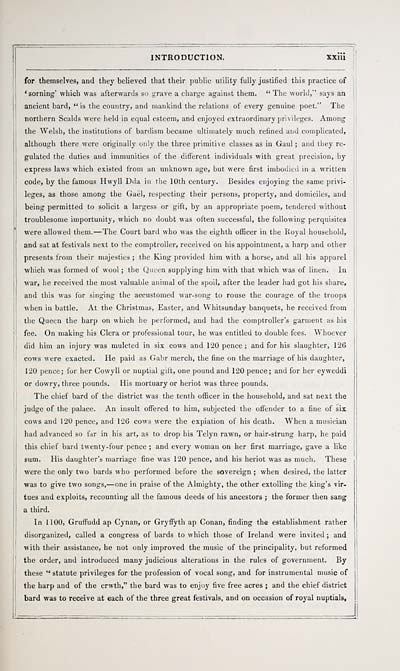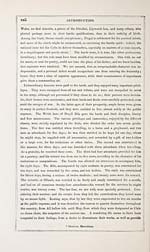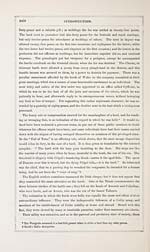Blair Collection > Sar-obair nam bard gaelach, or, The beauties of Gaelic poetry, and lives of the Highland bards
(33)
Download files
Complete book:
Individual page:
Thumbnail gallery: Grid view | List view

INTRODUCTION.
for themselves, and they believed that their public utility fully justified this practice of
'sorning' which was afterwards sn grave a charge against them. "The world," says an
ancient bard, "is the country, and mankind the relations of every genuine poet." The
northern Scalds were held in equal esteem, and enjoyed extraordinary privileges. Among
the Welsh, the institutions of bardism became ultimately much refined and complicated,
although there were originally only the three primitive classes as in Gaul ; and they re-
gulated the duties and immunities of the different individuals with great precision, by
express laws which existed from an unknown age, but were first imbodied in a written
code, by the famous Hwyll Dda in the 10th century. Besides enjoying the same privi-
leges, as those among the Gael, respecting their persons, property, and domiciles, and
being permitted to solicit a largess or gift, by an appropriate poem, tendered without
troublesome importunity, which no doubt was often successful, the following perquisites
were allowed them. — The Court bard who was the eighth officer in the Royal household,
and sat at festivals next to the comptroller, received on his appointment, a harp and other
presents from their majesties ; the King provided him with a horse, and all his apparel
which was formed of wool ; the Quten supplying him with that which was of linen. In
war, he received the most valuable animal of the spoil, after the leader had got his share,
and this was for singing the accustomed war-song to rouse the courage of the troops
when in battle. At the Christmas, Easter, and Whitsunday banquets, he received from
the Queen the harp on which he performed, and had the comptroller's garment as his
fee. On making his Clera or professional tour, he was entitled to double fees. Whoever
did him an injury was mulcted in six cows and 120 pence ; and for his slaughter, 126
cows were exacted. He paid as Gabr merch, the fine on the marriage of his daughter,
120 pence; for her Cowyll or nuptial gift, one pound and 120 pence; and for her eyweddi
or dowry, three pounds. His mortuary or heriot was three pounds.
The chief bard of the district was the tenth officer in the household, and sat next the
judge of the palace. An insult offered to him, subjected the offender to a fine of sii
cows and 120 pence, and 126 cows were the expiation of his death. When a musician
had advanced so far in his art, as to drop his Telyn rawn, or hair-strung harp, he paid
this chief bard twenty-four pence ; and every woman on her first marriage, gave a like
Bum. His daughter's marriage fine was 120 pence, and his heriot was as much. These
were the only two bards who performed before the sovereign ; when desired, the latter
was to give two songs, — one in praise of the Almighty, the other extolling the king's vir-
tues and exploits, recounting all the famous deeds of his ancestors ; the former then sang
a third.
In 1100, Gruffudd ap Cynan, or GryfFyth ap Conan, finding the establishment rather
disorganized, called a congress of bards to which those of Ireland were invited ; and
with their assistance, he not only improved the music of the principality, but reformed
the order, and introduced many judicious alterations in the rules of government. By
these " statute privileges for the profession of vocal song, and for instrumental music of
the harp and of the crwth," the bard was to enjoy five free acres ; and the chief district
bard was to receive at each of the three great festivals, and on occasion of royal nuptials.
for themselves, and they believed that their public utility fully justified this practice of
'sorning' which was afterwards sn grave a charge against them. "The world," says an
ancient bard, "is the country, and mankind the relations of every genuine poet." The
northern Scalds were held in equal esteem, and enjoyed extraordinary privileges. Among
the Welsh, the institutions of bardism became ultimately much refined and complicated,
although there were originally only the three primitive classes as in Gaul ; and they re-
gulated the duties and immunities of the different individuals with great precision, by
express laws which existed from an unknown age, but were first imbodied in a written
code, by the famous Hwyll Dda in the 10th century. Besides enjoying the same privi-
leges, as those among the Gael, respecting their persons, property, and domiciles, and
being permitted to solicit a largess or gift, by an appropriate poem, tendered without
troublesome importunity, which no doubt was often successful, the following perquisites
were allowed them. — The Court bard who was the eighth officer in the Royal household,
and sat at festivals next to the comptroller, received on his appointment, a harp and other
presents from their majesties ; the King provided him with a horse, and all his apparel
which was formed of wool ; the Quten supplying him with that which was of linen. In
war, he received the most valuable animal of the spoil, after the leader had got his share,
and this was for singing the accustomed war-song to rouse the courage of the troops
when in battle. At the Christmas, Easter, and Whitsunday banquets, he received from
the Queen the harp on which he performed, and had the comptroller's garment as his
fee. On making his Clera or professional tour, he was entitled to double fees. Whoever
did him an injury was mulcted in six cows and 120 pence ; and for his slaughter, 126
cows were exacted. He paid as Gabr merch, the fine on the marriage of his daughter,
120 pence; for her Cowyll or nuptial gift, one pound and 120 pence; and for her eyweddi
or dowry, three pounds. His mortuary or heriot was three pounds.
The chief bard of the district was the tenth officer in the household, and sat next the
judge of the palace. An insult offered to him, subjected the offender to a fine of sii
cows and 120 pence, and 126 cows were the expiation of his death. When a musician
had advanced so far in his art, as to drop his Telyn rawn, or hair-strung harp, he paid
this chief bard twenty-four pence ; and every woman on her first marriage, gave a like
Bum. His daughter's marriage fine was 120 pence, and his heriot was as much. These
were the only two bards who performed before the sovereign ; when desired, the latter
was to give two songs, — one in praise of the Almighty, the other extolling the king's vir-
tues and exploits, recounting all the famous deeds of his ancestors ; the former then sang
a third.
In 1100, Gruffudd ap Cynan, or GryfFyth ap Conan, finding the establishment rather
disorganized, called a congress of bards to which those of Ireland were invited ; and
with their assistance, he not only improved the music of the principality, but reformed
the order, and introduced many judicious alterations in the rules of government. By
these " statute privileges for the profession of vocal song, and for instrumental music of
the harp and of the crwth," the bard was to enjoy five free acres ; and the chief district
bard was to receive at each of the three great festivals, and on occasion of royal nuptials.
Set display mode to: Large image | Transcription
Images and transcriptions on this page, including medium image downloads, may be used under the Creative Commons Attribution 4.0 International Licence unless otherwise stated. ![]()
| Early Gaelic Book Collections > Blair Collection > Sar-obair nam bard gaelach, or, The beauties of Gaelic poetry, and lives of the Highland bards > (33) |
|---|
| Permanent URL | https://digital.nls.uk/81868264 |
|---|
| Description | A selection of books from a collection of more than 500 titles, mostly on religious and literary topics. Also includes some material dealing with other Celtic languages and societies. Collection created towards the end of the 19th century by Lady Evelyn Stewart Murray. |
|---|
| Description | Selected items from five 'Special and Named Printed Collections'. Includes books in Gaelic and other Celtic languages, works about the Gaels, their languages, literature, culture and history. |
|---|

